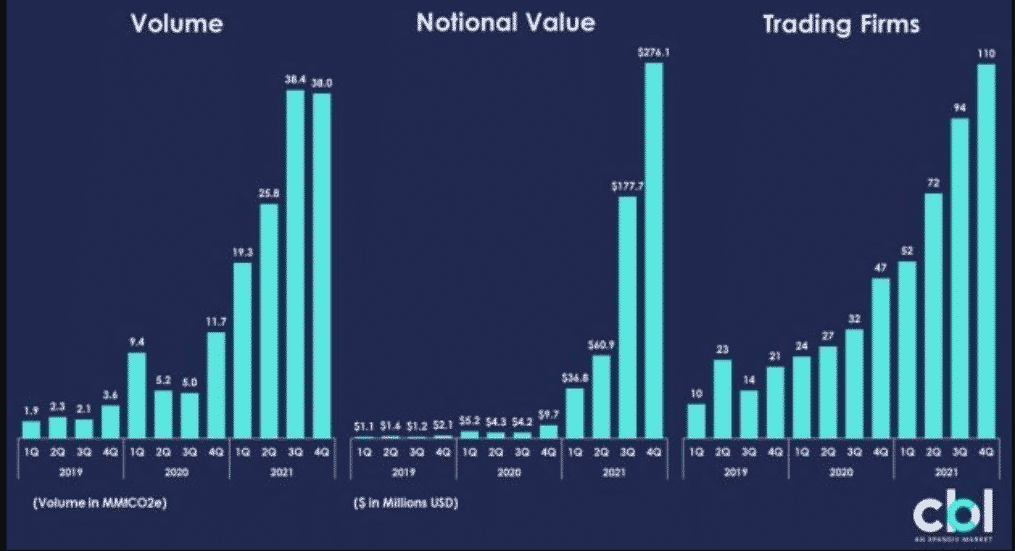Right now, the carbon space is heating up. Dozens of companies are jumping into what’s fast becoming one of the hottest spaces to invest in. But like in other fledgling industries, many of the top carbon companies are still private.
Most of the publicly listed carbon investments you can find on stock exchanges right now are exchange-traded funds (ETFs) that hold carbon credit futures such as those found on the EU’s Emissions Trading System.
While these products can be fantastic ways to add exposure to the performance of carbon credits to your portfolio, they aren’t the most exciting.
That’s because carbon credits are a commodity, like gold or oil. And junior commodity companies will often see leveraged performance compared to that of their underlying commodity.
What that means is that when a commodity goes up, a junior company based in that commodity sector tends to go up by more.
Of course, the reverse is also true – when a commodity goes down, a junior company based in that commodity sector tends to go down by more as well.
In addition to this, as previously mentioned, many junior carbon companies are still private. This adds an extra layer of risk:
-
For private companies, unlike publicly listed companies, there’s no guarantee that you’ll be able to sell your shares whenever you’d like to do so.
Whether or not the potential for leveraged returns outweighs these risks is something only individual investors can decide for themselves.
Furthermore, opportunities to buy into top private carbon companies aren’t common, and require either good timing or knowing someone with access to the deal like a private broker. For patient investors, waiting for a private company’s go-public transaction, such as an IPO, can be an excellent alternative for buying into the company, provided that the price is right.
With that said, let’s take a look at three of the best private carbon companies in the sector right now.
But before we discuss each one of them, it would help to highlight the importance of investing in carbon credits and its impact on climate change.
The Importance of Investing in Carbon Credits
Betting your money in carbon credits and the companies that trade them is like paying off your (carbon) debts before investing. That’s because your investment will help get rid of “dirty” companies that pump greenhouse gas into the atmosphere.
The top carbon companies, including the private ones, are instead putting funds to projects that promote the transition to a low carbon economy. It means they help avoid or reduce emissions by supporting cleaner energy sources.
Common examples of projects that reduce carbon pollution are reforestation, carbon capture, use and storage, and more.
Your money can also incentivize farmers to not turn grasslands (major carbon sink) into crops.
Either way, you’d be glad to know that your investment will not only give you some monetary return but it will help fight climate change.
So here are the top private carbon companies you can choose from.
1. Xpansiv
Topping our list is the U.S.-based online commodities marketplace Xpansiv.
Formed from the merger of two different companies in 2019, Xpansiv is currently the market leader among all carbon exchanges for voluntary carbon credits.
- Currently, around 90% of all global voluntary carbon credit transactions go through Xpansiv’s marketplace.
The carbon firm prices carbon, energy, and water-based transactions. And the company does this in an intuitive, user-friendly environment based on deeper data.
On its platform, users can trade a broad range of carbon credits from major carbon registries around the world. The long list of clients includes big organizations like airlines and financial institutions.
Xpansiv has seen phenomenal growth alongside the voluntary carbon markets, as the chart below shows:
Their investors certainly like what they’ve been seeing as well. Xpansiv has raised over US$500 million since its merger in 2019, including a $40 million pre-IPO raise completed last January.
Blackstone alone committed $400 million to lead a strategic investment in Xpansiv in July this year.
And within the next month, it acquired two companies, APX and Evolution Markets, to scale environmental commodity market infrastructure and expand global market infrastructure respectively.
Recently, APX has launched ESGclear, an innovative solution that provides transparency for transactions that require ESG reporting, financing, and mitigation across supply chains.
So, for investors looking for exposure to the voluntary carbon markets, as well as other ESG-inclusive commodities, Xpansiv is definitely the top private carbon company to keep a close eye on, particularly as they near a go-public transaction.
2. DevvStream
Next on our list is DevvStream, a carbon credit streaming company with some significant business partnerships in play.
Streaming is an excellent business model, which has been seen in numerous other sectors such as the music and precious metals industries.
As such, it makes sense that DevvStream isn’t the only carbon streaming company around. What sets them apart, however, are the partnerships. More notably, DevvStream’s parent company, Devvio, runs a proprietary blockchain-based ESG platform with a number of major corporate clients.
DevvStream can use this platform to onboard their carbon credits onto Devvio’s blockchain, where they will get priority access to any of Devvio’s corporate clients looking to reduce their carbon footprint.
Most significantly, DevvStream partners with the United Cities North America. They are an arm of the United Nation’s smart city program that advances the UN’s Sustainable Development Goals across cities around the world.
This strategic partnership will provide sustainable, high-quality projects to DevvStream for their streaming portfolio while giving them access to every project United Cities will be working on.
On top of it all, it will give the carbon streaming company the ability to take any technology partnerships and projects it invests in and bring it to the smart cities program.
These valuable partnerships give DevvStream a competitive edge over its peers and make it number two on our list of top private carbon companies to watch.
While the company has received conditional approval to list on the Canadian NEO exchange, it hasn’t gone public yet, and an IPO financing would potentially make for the perfect entry point into this company.
3. Global Carbon Credit Corp.
Last but not least on our list to keep an eye on is Global Carbon Credit Corp.
Global Carbon has a simple business model: they’re looking to acquire a diverse portfolio of voluntary carbon credits through both direct purchase as well as, potentially, streaming agreements.
By doing this, the company will be able to become a proxy for the price performance of voluntary carbon credits.
While many such ETFs already exist for the compliance carbon markets such as the E.U.’s EUAs and California’s CCAs, Global Carbon would be one of the first companies to do this for the voluntary carbon markets, giving them an early move advantage.
On top of this, Global Carbon’s CEO, Anthony Milewski, previously did the exact same thing with a different ESG-friendly commodity – cobalt, which is used extensively in electric vehicle batteries.
Mr. Milewski was able to sell his previous company, Cobalt 27, for half a billion dollars Canadian – and he’s looking to apply the same business model and experience from his previous success to Global Carbon.
While Global Carbon hasn’t given any indication as to a potential IPO timing yet, the company did mention that it would use its best effort to get a listing on a North American stock exchange when they announced a CAD $35 million financing just earlier this March.
In other words, an IPO could be on the horizon for Global Carbon – giving it the third spot on our list of top private carbon companies to watch.
A Few Tips to Remember
If you’ve decided that investing in carbon credits is the best way for you to grow your money responsibly, the best private carbon companies above are a good place to start.
Whether you’re more interested in growing trees to suck in CO2 from the air or promoting renewable energy use in communities, those companies have it all.
But to make sure that your dollars are making a real difference in the battle against global warming, take note of the following tips when making your final choice.
- Projects are third-party verified
All projects that produce carbon credits should be verified and certified by internationally recognized carbon standards. This means the projects meet strict criteria ensuring you that their emissions reductions are real and verifiable. The top carbon verifiers are Verra’s Verified Carbon Standards, Gold Standard, American Carbon Registry, and Climate Action Reserve.
- Projects provide “additionality”
Make sure that the project was only made possible by carbon funding. If it would have happened anyway even without the funding support, your money is probably better invested elsewhere.
-
Transparency is key
Not all top private carbon companies work the same. A reputable one will have all information about their projects, methods, quality standard protocols, etc. readily accessible on their website. See to it that standards and frameworks are transparent so you know the value of your investment.
- Carbon credit retirement
All projects should be listed on a carbon registry so that carbon companies can use them as reference when retiring carbon credits. This is crucial for you to ensure that the credits you bought are not resold. Otherwise, they’ll be double counted in accounting and reporting emissions reductions.
These are just some of the reminders you need to keep in mind. You may also want to know what are the best carbon credits to buy.
And if you want to take your search further, you can also learn more about the top carbon exchanges that you can add to your investment portfolio.
Disclosure: Carboncredits.com and its employees and officers may own positions in all companies mentioned and have been compensated. The information provided is for informational purposes only and is not an offer to buy or sell securities. This is not financial advice.
Please read our full DISCLOSURE here.
Disclosure: Owners, members, directors and employees of carboncredits.com have/may have stock or option position in any of the companies mentioned:
Carboncredits.com receives compensation for this publication and has a business relationship with any company whose stock(s) is/are mentioned in this article
Additional disclosure: This communication serves the sole purpose of adding value to the research process and is for information only. Please do your own due diligence. Every investment in securities mentioned in publications of carboncredits.com involve risks which could lead to a total loss of the invested capital.


